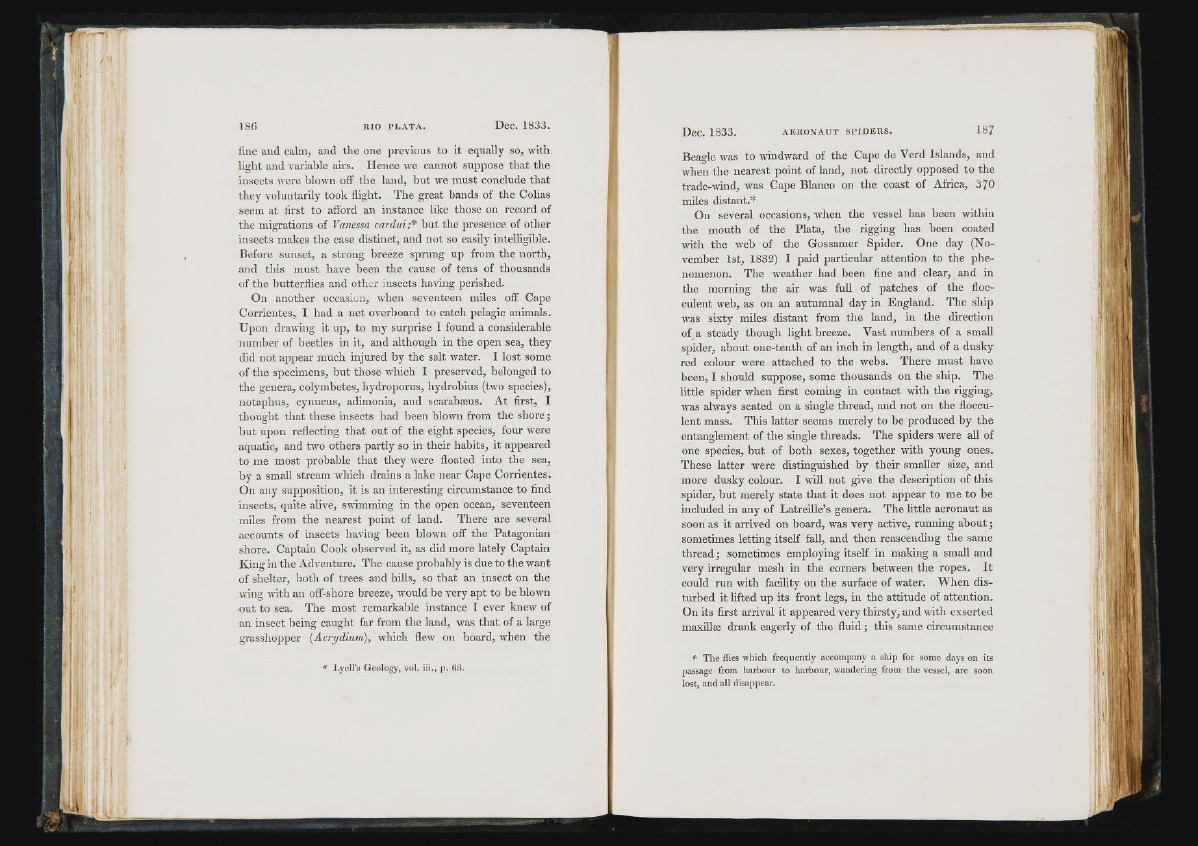
fine and calm, and the one previous to it equally so, with
light and variable airs. Hence we cannot suppose that the
insects were blown off the land, but we must conclude that
they voluntarily took flight. The great bands of the Colias
seem at first to afford an instance like those on record of
the migrations of Vanessa cardui;* but the presence of other
insects makes the case distinct, and not so easily intelligible.
Before sunset, a strong breeze sprung up from the north,
and this must have been the cause of tens of thousands
of the butterflies and other insects having perished.
On another occasion, when seventeen miles off Cape
Corrientes, I had a net overboard to catch pelagic animals.
Upon drawing it up, to my surprise I found a considerable
number of beetles in it, and although in the open sea, they
did not appear much injured by the salt water. I lost some
of the specimens, but those which I preserved, belonged to
the genera, oolymbetes, hydroporus, liydrobius (two species),
notaphus, cynucus, adimonia, and scarabæus. At first, I
thought that these insects had been blown from the shore ;
but upon reflecting that out of the eight species, four were
aquatic, and two others partly so in their habits, it appeared
to me most probable that they were floated into the sea,
by a small stream which drains a lake near Cape Corrientes.
On any supposition, it is an interesting circumstance to find
insects, quite alive, swimming in the open ocean, seventeen
miles from the nearest point of land. There are several
accounts of insects having been blown off the Patagonian
shore. Captain Cook observed it, as did more lately Captain
King in the Adventure. The cause probably is due to the want
of shelter, both of trees and hiUs, so that an insect on the
wing with an off-shore breeze, would be very apt to be blown
out to sea. The most remarkable instance I ever knew of
an insect being caught far from the land, was that of a large
grasshopper {Acrydium), which flew on board, when the
* L y e ll’s Geo lo g y , vol. iii., p . 63.
Beagle was to windward of the Cape de Verd Islands, and
when the nearest point of land, not directly opposed to the
trade-wind, was Cape Blanco on the coast of Africa, 370
miles distant.*
On several occasions, when the vessel has been within
the mouth of the Plata, the rigging has been coated
with the web of the Gossamer Spider. One day (November
1st, 1832) I paid particular attention to the phenomenon.
The weather had been fine and clear, and in
the morning the air was full of patches of the flocculent
web, as on an autumnal day in England. The ship
was sixty miles distant from the land, in the direction
of a steady though light breeze. Vast numbers of a small
spider, about one-tenth of an inch in length, and of a dusky
red colour were attached to the webs. There must have
been, I should suppose, some thousands on the ship. The
little spider when first coming in contact with the rigging,
was always seated on a single thread, and not on the flocculent
mass. This latter seems merely to be produced by the
entanglement of the single threads. The spiders were all of
one species, but of both sexes, together with young ones.
These latter were distinguished by their smaller size, and
more dusky colour. I will not give the description of this
spider, but merely state that it does not appear to me to be
included in any of LatreiUe’s genera. The little aeronaut as
soon as it arrived on board, was very active, running about;
sometimes letting itseff fall, and then reascending the same
thread; sometimes employing itself in making a small and
very irregular mesh in the corners between the ropes. It
could run with facihty on the surface of water. When disturbed
it lifted up its front legs, in the attitude of attention.
On its first arrival it appeared very thirsty, and with exserted
maxillie drank eagerly of the fluid; this same circumstance
r i ! t..i
il
Ii 'i
* T h e flies w h ich f r e q u e n tly a c com p a n y a s h ip fo r som e d ay s o n its
p assag e from h a rb o u r to h a rb o u r , w a n d e r in g from th e vessel, a re so o n
lo st, a n d a ll d isa p p e a r.